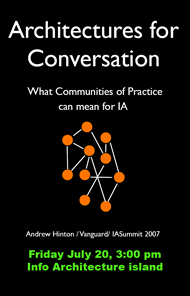
I don’t know the exact release date, but I do know that it was right about ten years ago that I first heard OK Computer.
In May of ’97, I had just finished my MFA in Creative Writing at UNC Greensboro. But I had no job prospects. I’d had a job lined up for me at a small press out of state, run by some dear friends and mentors of mine, but money issues and a new baby made it so at the last minute, I had to turn that opportunity down. (I handled it horribly, and lost some dear friends because of it.)
My future, or my identity in a sense, felt completely unmoored. The thing I’d assumed for two years I’d be doing after finishing my degree was no longer an option; I’d fallen out of love with teaching, and didn’t really have any good opportunities to do that anyway. All I had going was this nerdy hobby I’d been obsessing on for some years: the Web.
So, I needed a job, and ended up talking my way into a technical writing gig in the registrar’s office of my MFA alma mater. I wouldn’t be editing poems and fiction for a press or a journal (as I’d gotten used to doing and thinking of myself as doing) but writing tutorials and help instructions for complicated, workaday processes and applications. But at least I’d be on the “Web Team” — helping figure out how to better use the Web for the school. I’d been working with computer applications, designing them and writing instructions for them, off and on in my side-job life while I’d been in grad school, so it wasn’t a total stretch. It just wasn’t where I imagined my career would take me.
That summer, in a fit of (possibly misplaced) optimism and generosity, my new employer sent me to a posh seminar in Orlando to learn better Photoshop skills. And one of the presenters there was the guy who made some of the most collected X-Files trading cards around, and an acknowledged wunderkind with digital mixed-media collages. (Cannot find his name…)
As I was waiting to see this guy’s presentation, and people were filing into the presentation room, he was setting up and had a slideshow of his creepy graphics going onscreen. And this spooky, ethereal, densely harmonic, splintery music was playing over the room’s speakers. I was feeling a little transfixed.
And, of course, when I asked him later what it was, he said it was Radiohead’s OK Computer.
Here’s the thing: I’d heard Radiohead interviewed on NPR by Bob Woodward about a month or so before, where they discussed the new album, the band’s methods, how they recorded most of it in Jane Seymour’s ancient country mansion. And they played clips from it throughout, and I remember thinking “wow, that’s just too over the top for me… a little too strange. I guess I won’t be getting that album — sounds like experiment for its own sake.”
It’s just one of a thousand times this has happened to me — conservative, knee-jerk reaction to something, only to come to embrace it later.
Something about this music connected with me on a deep level at that time in my life, and through a lot of things going on in my own head. It *sounded* like my own head. And, to some degree, it still does, though now I feel it’s more of a remnant of a younger self. Yet this music still feels quite right, quite relevant now, but I hear different things in it.
So. This just occurred to me. Had to share. I’m on record as a huge Radiohead fan, even though I realize this isn’t exactly a unique thing to be. I’ve found every release of theirs to be fascinating, challenging, and rewarding once it has a chance to settle in. (Not a huge fan of Thom Yorke’s solo effort, but I’m glad it’s out of his system, so to speak — then again, who knows, four years from now it may be my favorite thing ever.)
They have a new album coming out sometime this year, if all stars align correctly. Can’t wait.





